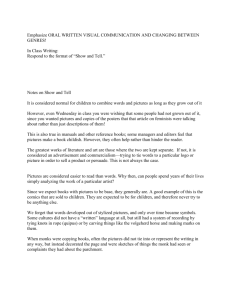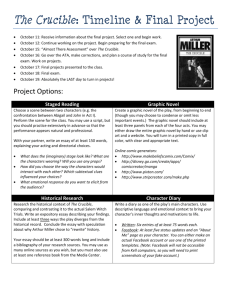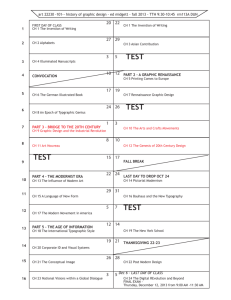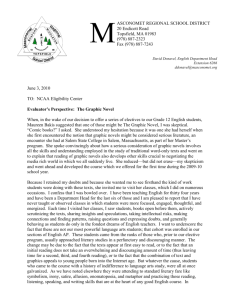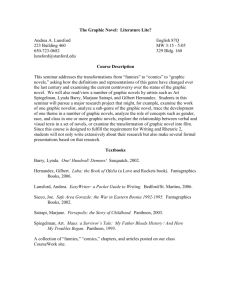THE GRAPHIC NOVEL: SPIDER-MAN TO PERSEPOLIS Offered as
advertisement
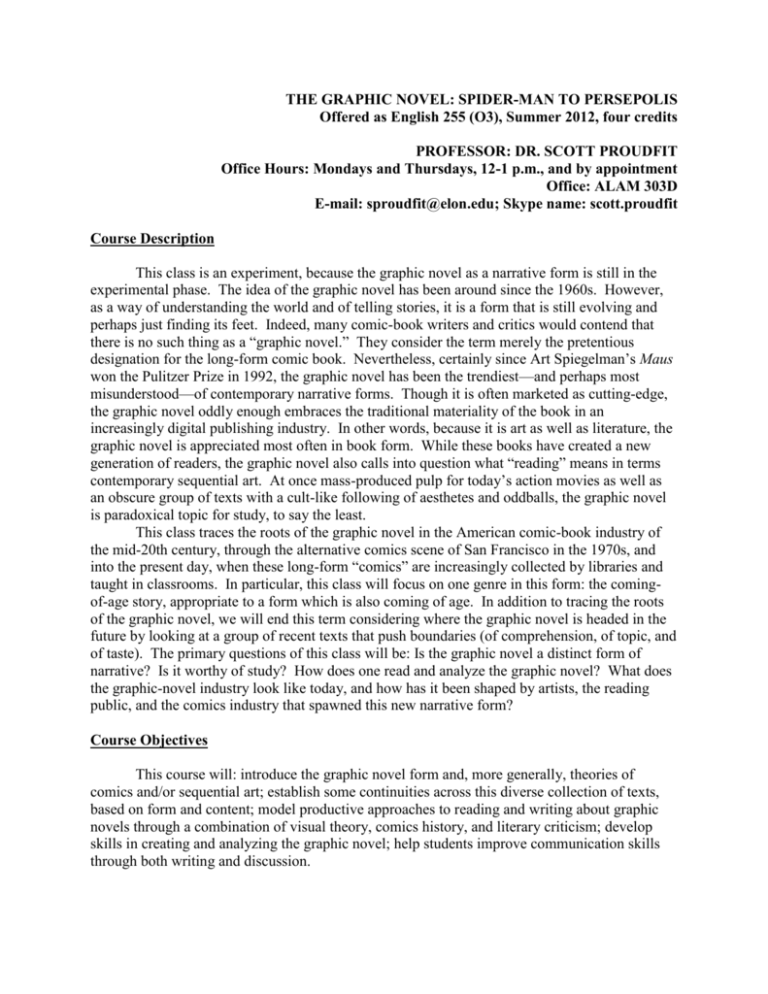
THE GRAPHIC NOVEL: SPIDER-MAN TO PERSEPOLIS Offered as English 255 (O3), Summer 2012, four credits PROFESSOR: DR. SCOTT PROUDFIT Office Hours: Mondays and Thursdays, 12-1 p.m., and by appointment Office: ALAM 303D E-mail: sproudfit@elon.edu; Skype name: scott.proudfit Course Description This class is an experiment, because the graphic novel as a narrative form is still in the experimental phase. The idea of the graphic novel has been around since the 1960s. However, as a way of understanding the world and of telling stories, it is a form that is still evolving and perhaps just finding its feet. Indeed, many comic-book writers and critics would contend that there is no such thing as a “graphic novel.” They consider the term merely the pretentious designation for the long-form comic book. Nevertheless, certainly since Art Spiegelman’s Maus won the Pulitzer Prize in 1992, the graphic novel has been the trendiest—and perhaps most misunderstood—of contemporary narrative forms. Though it is often marketed as cutting-edge, the graphic novel oddly enough embraces the traditional materiality of the book in an increasingly digital publishing industry. In other words, because it is art as well as literature, the graphic novel is appreciated most often in book form. While these books have created a new generation of readers, the graphic novel also calls into question what “reading” means in terms contemporary sequential art. At once mass-produced pulp for today’s action movies as well as an obscure group of texts with a cult-like following of aesthetes and oddballs, the graphic novel is paradoxical topic for study, to say the least. This class traces the roots of the graphic novel in the American comic-book industry of the mid-20th century, through the alternative comics scene of San Francisco in the 1970s, and into the present day, when these long-form “comics” are increasingly collected by libraries and taught in classrooms. In particular, this class will focus on one genre in this form: the comingof-age story, appropriate to a form which is also coming of age. In addition to tracing the roots of the graphic novel, we will end this term considering where the graphic novel is headed in the future by looking at a group of recent texts that push boundaries (of comprehension, of topic, and of taste). The primary questions of this class will be: Is the graphic novel a distinct form of narrative? Is it worthy of study? How does one read and analyze the graphic novel? What does the graphic-novel industry look like today, and how has it been shaped by artists, the reading public, and the comics industry that spawned this new narrative form? Course Objectives This course will: introduce the graphic novel form and, more generally, theories of comics and/or sequential art; establish some continuities across this diverse collection of texts, based on form and content; model productive approaches to reading and writing about graphic novels through a combination of visual theory, comics history, and literary criticism; develop skills in creating and analyzing the graphic novel; help students improve communication skills through both writing and discussion. Learning Outcomes Students will: 1. Read a broad range of graphic novels, from the form’s origins in the 1970s to the present day. 2. Interpret graphic novels both in discussion and in writing through close reading, intertextual analysis, and historical contextualization. 3. Consider how the interpretation of the graphic novel differs from the interpretation of other kinds of writing and/or other media. 4. Apply a handful of theories and ideas about comics and visual storytelling to specific texts. 5. Investigate the concept of “the graphic novel” as a potentially useful critical genre. 6. Try their hands at graphic novel creation and critical research on the topic. Course Texts Course texts for this class are expensive because graphic novels (unfortunately) are still very expensive. All of the required books will be placed on reserve at Elon’s library (which will help if you are on campus this summer). Otherwise, feel free to purchase these texts in whatever way is cheapest for you—or get them from a public library, if possible. Tom DeFalco, et al., Spider-Man: Maximum Carnage, Marvel Comics ($30 at Elon Bookstore) Frank Miller, Batman: The Dark Knight Returns, DC Comics ($15 at Elon) Scott McCloud, Understanding Comics, William Morrow Paperbacks ($22.99 at Elon) Art Spiegelman, Maus I, Pantheon Books ($15.95 at Elon) Art Spiegelman, Maus II, Pantheon Books ($15.95 at Elon) Bryan Talbot, The Tale of One Bad Rat, Dark Horse ($19.99 at Elon) Daniel Clowes, Ghost World, Fantagraphics Books ($12 at Elon) David B., Epileptic, Pantheon Books ($19 at Elon) Craig Thompson, Blankets, Top Shelf Productions ($30 at Elon) Alison Bechdel, Fun Home, Mariner Books ($14 at Elon) Charles Burns, Black Hole, Pantheon Books ($19 at Elon) David Mazzucchelli, Asterios Polyp, Panthon ($29.95 at Elon) Chris Ware, Jimmy Corrigan: The Smartest Kid on Earth, Pantheon Books ($20 at Elon) Marjane Satrapi, Persepolis, Pantheon Books ($14 at Elon) In addition to these texts, there will be a free course pack for this class with additional readings. Course Requirements and Evaluation Methods Participation/Discussion Forums (20% of grade) You must contribute to 8 out of the 9 discussion forums on moodle: Our goal is to learn from each other and share insights about these texts. The one discussion forum you choose to skip is up to you. Just make sure you don’t skip more than one. In preparation for each forum, you are expected to read my comments/questions about the given reading or watch a PowerPoint I have prepared on the material. Each discussion forum becomes active at 10 a.m. (E.S.T.) and end at 10 p.m. (E.S.T.). For each fourm, you post a comment (no fewer than three sentences, no more than two paragraphs), pose a question for the class, and respond to one other comment (no less than a sentence, no more than a paragraph). Your question/comments cannot be redundant with any other question/comment on the same material. Whoever submits his or her post first has an ‘open slate’; all others must first read all prior posts to avoid redundancy. The person first to post, however, does have to comment on at least one other post later in the session. Your participation grade will be earned based on the rigor, thoughtfulness, and creativity of the questions/comments you pose for group discussion. Excellent questions/comments reflect careful reading of the assigned material, and attempt to relate the assigned material to other concepts from this course. I will monitor the posts and clarify any grey areas. The purpose of your participation is to demonstrate your understanding of the material and your ability to reflect deeply and critically and share those reflections with the class. In addition to discussion forums, you may e-mail me questions, and I will bring them into discussion. Each forum is worth 2.5% of your grade. Quizzes (15% of grade) There will be fifteen quizzes this summer. Each is worth one percent of your total grade. Quizzes will be available the day that the reading is due, from 10 a.m.-10 p.m. E.S.T. Quizzes are timed to give you enough time to complete them, but not enough time to look up the answers. There are no make-up quizzes. All of the content on quizzes will be from the reading. Film Adaptation Presentation (10% of grade) For this PowerPoint presentation, you will choose a graphic novel that has been adapted into a film. You will read the novel and watch the film. You will then analyze the adaptation of one particular scene from the novel. You will create a PowerPoint explaining your analysis and post it to a special moodle forum. The entire class will watch the presentations once they are posted on June 21. Annotated Bibliography (10% of grade) For this assignment you will choose one particular category of graphic novels and do some research in order to prepare a bibliography of the top 10 most important texts in this category. Imagine that you are preparing to teach a class or planning purchases for a library. What are the 10 essential graphic novels in this area? You do not have to read all of these novels, but the more familiar you are with your selections, the better. Create Your Own Graphic Novel (10% of grade) For this assignment you must create your own graphic story. Your story (of at least eight pages) must be told through a combination of images and writing in the comics style. You may tell a personal story or retell a fairy tale. You are not expected to be an artist. You may use collage, drawing, painting, any medium you can think of, to create your story. You may design on a computer or freehand. 2 Essays (35% of grade) 1) a 2-page “close reading” essay, worth 15% of grade; 2) a 5-page comparative essay, worth 20% of grade. Essays must be turned in on the specified due date. No extensions will be granted. Detailed essay assignments will follow. Office Hours I will be available in person, online, and via Skype on Mondays and Thursdays, 12-1 p.m. Homework This is a reading intensive course. You will be required to read for every class which means, of course, that you must make time to read what can often times be lengthy and difficult material. You cannot pass a reading intensive course if you do not do the readings. Disabilities If you are a student with a documented disability who will require accommodations in this course, please register with Disabilities Services in the Duke Building, Room 108 (2786500), for assistance in developing a plan to address your academic needs. The Honor Code You are expected to abide by the university’s honor code, which you can find online at http://www.elon.edu/e-web/students/handbook/honorcpp.xhtml. In particular, you should familiarize yourself with Elon’s policies regarding plagiarism. Elon University’s Definition of Plagiarism Definition: Presenting the work or ideas of another as one’s own (i.e. without proper acknowledgement of the source). The sole exception to the requirement of acknowledging sources is when the ideas or information are common knowledge. Any student must be thoroughly familiar with methods for documenting the use of another person’s sentences, arguments, or ideas. Scope - all encompassing. Examples: Plagiarism includes, but is not limited to, failure to do the following: a. Direct quotation. Any direct quotation of any portion of any source must be placed in quotation marks and properly attributed to its author using documentation in accordance to the with the requirements of the appropriate current style manuals. The following example, which uses MLA style (other styles may be used in different classes), shows how a direct quotation is properly acknowledged: In her book titled The Subject of Semiotics, Kaja Silverman notes that “Madame Bovary places … an insistent emphasis on the cultural sources from which ideal images derive- churches, schools, the marketplace, literature – [which] may help to clarify for us what ideal representations are always socially mediated” (Silverman 161). Works Cited Silverman, Kaja. The Subject of Semiotics. New York: Oxford UP, 1983. b. Paraphrase. Prompt acknowledgement is required when material from any source is paraphrased or summarized in a whole or in part in one’s own words and writing style. To acknowledge or paraphrase properly, one might state: “To paraphrase Locke’s comment…” or “According to Rousseau…”, and conclude with a citation identifying the exact reference. c. Attributing any ideas, research results, procedures or concepts not one’s own to the original source. When referring to another’s work, proper credit must be given to the source, even if one neither paraphrases nor quotes directly from that work. A footnote or an endnote should fully identify the source. The way in which a student and/or researcher chooses to handle documentation of other’s ideas and words has a direct bearing on the integrity of the community in which s/he operates. Students should therefore give careful consideration when preparing any paper or doing any type of research. To test your knowledge on citation, see: http://education.indiana.edu/~frick/plagiarism/item1.html Grade Conversion Chart Excellent College-Level Work: Good College-Level Work: Adequate College-Level Work: Poor College-Level Work: A = 93-100 A- = 90-92 B+ = 87-89 B = 83-86 B- = 80-82 C+ = 77-79 C = 73-76 C- = 70-72 D+ = 67-69 D = 63-66 D- = 60-62 F = 0-59 Course Schedule BEGINNINGS THURS MAY 31 A Brief History of the Comics Industry and How a Comic Is Built FRI JUNE 1 Mainstream Comics Spider-Man: Maximum Carnage (1994) and Batman: The Dark Knight Returns (1986) DISCUSSION FORUM; QUIZ MON JUNE 4 Comics Theory Scott McCloud’s Understanding Comics (1994) TUES JUNE 5 The Birth of the “Graphic” Novel, 1960s-1980s Selections from A Contract With God and Binky Brown Meets the Holy Virgin Mary DISCUSSION FORUM; QUIZ WED JUNE 6 Robert Crumb, 1960s-present Selections from The Complete Crumb and The Book of Genesis Watch Crumb QUIZ THURS JUNE 7 Alternative Comics, 1970s-1990s Selections from American Splendor and Love and Rockets QUIZ FRI JUNE 8 Alternative Comics, 1970s-1990s Selections from A Child’s Life and One! Hundred! Demons! DISCUSSION FORUM; QUIZ TOO BIG FOR WORDS? MON JUNE 11 “Silent” Comics Selections from The Portable Frank (2008); plus, Space Dog or Robot Dreams TUES JUNE 12 Art Spiegelman’s Maus I (1986) QUIZ WED JUNE 13 Art Spiegelman’s Maus II (1991) DUE: FIRST ESSAY DISCUSSION FORUM COMING OF AGE THURS JUNE 14 Bryan Talbot’s The Tale of One Bad Rat (1994) QUIZ FRI JUNE 15 Daniel Clowes’ Ghost World (1997) QUIZ MON JUNE 18 David B’s Epileptic (2003) DUE: ANNOTATED BIBLIOGRAPHY DISCUSSION FORUM; QUIZ TUES JUNE 19 Craig Thompson’s Blankets (2003) QUIZ WED JUNE 20 Alison Bechdel’s Fun Home (2006) DISCUSSION FORUM; QUIZ EXCURSIONS THURS JUNE 21 Film adaptation presentations: Watchmen, Scott Pilgrim Vs. the World, 300, etc. FRI JUNE 22 Report on Visit to Comics Store DISCUSSION FORUM PUSHING THE BOUNDARIES MON JUNE 25 Charles Burns’ Black Hole (2005) DUE: YOUR GRAPHIC NOVEL QUIZ TUES JUNE 26 David Mazzucchelli’s Asterios Polyp (2009) DISCUSSION FORUM; QUIZ WED JUNE 27 Chris Ware’s Jimmy Corrigan: The Smartest Kid on Earth (2000) QUIZ THURS JUNE 28 Marjane Satrapi’s Persepolis (2000) DUE: FINAL ESSAY DISCUSSION FORUM; QUIZ
